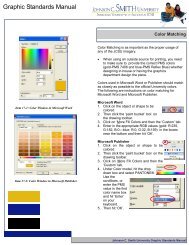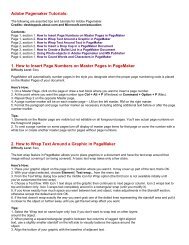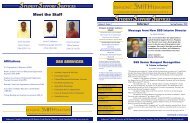Bulletin October 2003 [.pdf] - Johnson C. Smith University
Bulletin October 2003 [.pdf] - Johnson C. Smith University
Bulletin October 2003 [.pdf] - Johnson C. Smith University
Create successful ePaper yourself
Turn your PDF publications into a flip-book with our unique Google optimized e-Paper software.
Headline<br />
Upward Bound Brings <strong>University</strong><br />
Experience to More Than 100<br />
High School Students<br />
Acrime has occurred on campus, and Rene Kimray’s forensic<br />
science class has analyzed the scene. Although the crime<br />
has been staged, the lessons that these Upward Bound<br />
students receive at <strong>Johnson</strong> C. <strong>Smith</strong> <strong>University</strong> are real.<br />
“This program gives students a chance to take more advanced,<br />
college-prep courses,” said Kimray, an Upward Bound Forensics<br />
instructor and an outreach educator at Discovery Place. “I’ve seen<br />
students who did not have a great deal of confidence before they<br />
entered the program take flight<br />
and gain a deeper appreciation<br />
for science and for themselves.”<br />
Each year, more than 100<br />
students from area Charlotte-<br />
Mecklenburg high schools<br />
participate in the <strong>University</strong>hosted<br />
Upward Bound Program.<br />
The federally funded program<br />
gives high-potential, low-income,<br />
first-generation college students a<br />
glimpse of college life.<br />
Kendra Jones, a rising junior<br />
who’s been in the program for<br />
three years, took six classes a day<br />
and lived in Myers Hall as part of<br />
her Upward Bound Math and<br />
Science experience. In Forensics,<br />
she had to collect DNA samples,<br />
hair fibers and determine blood<br />
types in order to solve a mock<br />
crime. The class also included a<br />
visit to the morgue and crime lab.<br />
Not only are students<br />
involved in intensive academic instruction, but also through Upward<br />
Bound, they get a real taste of college life. During the six-week<br />
Residential Summer Program, students are provided room and board<br />
at JCSU.<br />
Jones said during the summer program, “You’re in charge of<br />
you. You have to learn how to cooperate, live with other people<br />
and manage your time wisely.”<br />
Tia Golden, a rising junior at Independence High School,<br />
aspires to be a pediatric surgeon and believes that Upward Bound<br />
gives her opportunities that she wouldn’t otherwise have to help her<br />
reach her goals.<br />
“Many students don’t have the same chance to gain these new<br />
experiences. I feel very fortunate,” said Golden.<br />
Through college visits, assistance with entrance exams and<br />
financial aid applications and career counseling, students like Jones<br />
and Golden are prepared to make the transition from high school to<br />
college.<br />
JCSU recently received two grants by the Department of<br />
Education totaling more than $500,000 each year to continue the<br />
Upward Bound and Upward Bound Math and Science Programs for<br />
the next four years. It is one of only two institutions in North<br />
Carolina to receive funding for the Upward Bound Math and Science<br />
Program.<br />
The <strong>University</strong> has been successful in its Upward Bound<br />
program since its inception in 1971 and the Upward Bound Math<br />
and Science Program since 1995. Each year, 99 to 100 percent of the<br />
graduating seniors complete the program and go on to college, said<br />
Magdalyn Lowe, JCSU Upward Bound director.<br />
Students receive services year round through the academic year<br />
and summer components. Lowe believes this exposure to the real<br />
college life experience is good preparation for the students. “We are<br />
excited to have the additional funding because it means that we can<br />
continue what we’ve begun, which is to ensure that students finish<br />
high school and are successful in completing college,” said Lowe.<br />
Renowned Author Challenges<br />
Young Minds<br />
Every author hopes to have a literary piece that changes the<br />
world. Darwin McBeth Walton—notable author and educator<br />
— achieved her goal through a book that has shifted the way<br />
children see color.<br />
In the early 1970’s, Walton recognized a lack of literature on<br />
the contributions of African-Americans. Teaching at a predominately<br />
African-American elementary school in Chicago during that time<br />
prompted her to do something about it.<br />
“There just wasn’t much available to share with my students,”<br />
says Walton. “In order to create good self images, I believe our<br />
children need to know about our rich history.”<br />
To fill in the gaps, Walton taught many of her lessons from<br />
Ebony magazines using assorted cut-outs of people, places and<br />
stories. She wanted to show her students more positive images<br />
of African-Americans.<br />
Her passion for dealing with the issue emerged through her<br />
writing, and in 1973, Walton had her first book published. Her<br />
landmark book, What Color Are You? published by <strong>Johnson</strong><br />
Publishing Company, was one of the first pieces about diversity<br />
to be used in the public schools. It describes the purpose of skin<br />
Rene Kimray, forensics instructor, and an Upward Bound student analyze the crime scene evidence.<br />
and the cause of various skin colors. The book also discusses<br />
the fact that skin color has no effect on basic human needs and<br />
feelings.<br />
“The book made it easy for teachers to speak to the fact of<br />
differences in color,” says Walton. Now, countless educators are<br />
using Walton’s book to address tough issues with children.<br />
What Color Are You? was not the first book Walton wrote,<br />
but she says it is the one that truly inspired her to continue to be<br />
a positive force in the education of children and parents. Her other<br />
books include Overcoming Challenges and Dance, Kayla.<br />
Walton, who attended <strong>Johnson</strong> C. <strong>Smith</strong> <strong>University</strong> in the 1940’s,<br />
lives in Illinois and remains in education at National Louis <strong>University</strong>.<br />
She continues to write and talk about the multi-cultural and diverse<br />
society in which our children are growing up.<br />
“All of our children are entitled to a fair education. Young<br />
teachers should work hard to keep our history alive in the schools<br />
for our children,” says Walton.<br />
Out of her love for JCSU and impressionable young minds,<br />
Walton has donated several of her books to the James B. Duke<br />
Memorial Library.<br />
<strong>University</strong> News<br />
Ying Bai, Ph.D.<br />
Assistant Professor of<br />
Computer Science and<br />
Engineering<br />
1<br />
7<br />
Spotlight<br />
Faculty<br />
FacultySpotlight<br />
Treasured<br />
Textbook<br />
An innovative, hands-on textbook by<br />
Professor Ying Bai gives students at<br />
<strong>Johnson</strong> C. <strong>Smith</strong> <strong>University</strong> what they<br />
need for IT success.<br />
Dr. Ying Bai, JCSU assistant professor of<br />
computer science and engineering, has<br />
taken a practical approach to a complex<br />
language—computer programming. His<br />
first textbook, Applications Interface<br />
Programming Using Multiple Languages: A<br />
Windows Programmer’s Guide, was just<br />
recently published and is gaining national<br />
recognition as an indispensable tool for<br />
programmers, software engineers, college<br />
students, researchers and professors.<br />
“Before I came to <strong>Johnson</strong> C. <strong>Smith</strong>, I<br />
had never written a book,” says Bai. “But I<br />
realized that our students needed<br />
something that was more organized, and<br />
the only way to do that was to develop an<br />
example-oriented book that students could<br />
use.”<br />
His textbook is the only one of its kind<br />
and is a hands-on, example-packed tool<br />
that guides readers through everything<br />
they need to know about interface<br />
multiple languages in Windows. With a<br />
CD-Rom included, each chapter has<br />
working examples to solve real-world<br />
problems.<br />
Bai teaches four to five classes each<br />
semester at JCSU and uses the new<br />
textbook to help students understand<br />
programming using multiple languages.<br />
His textbook is also being used by other<br />
computer and engineering professionals<br />
across the country. He has two more<br />
books that will be published in the near<br />
future including Mastering Electronics Via<br />
Labs and Serial Port Interface Handbook<br />
in Windows.<br />
Bai has published more than ten papers<br />
in journals and conferences, and his<br />
research interests include software<br />
engineering, mix-language programming,<br />
automatic and fuzzy logic control, robotics<br />
control and calibration as well as accurate<br />
measurements.<br />
Bai received his BS and MS degrees<br />
from Tsinghua <strong>University</strong> and Beijing<br />
Institute of Technology, China in 1983 and<br />
1987 respectively. He studied at Robotics<br />
Center at Florida Atlantic <strong>University</strong> and<br />
earned his Ph.D. in 2000. Before joining<br />
JCSU, Dr. Bai worked as a senior software<br />
engineer at different companies in the US<br />
and successfully developed many projects<br />
in industrial fields.


![Bulletin October 2003 [.pdf] - Johnson C. Smith University](https://img.yumpu.com/3798664/7/500x640/bulletin-october-2003-pdf-johnson-c-smith-university.jpg)


